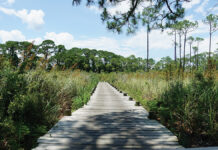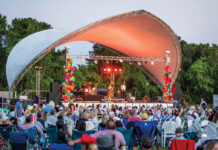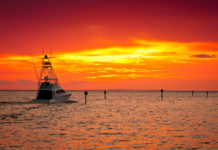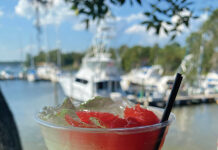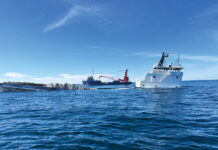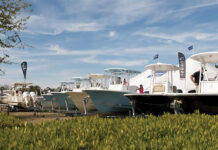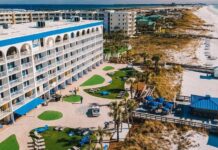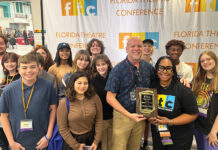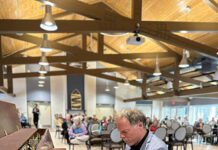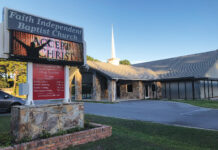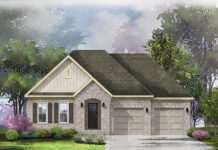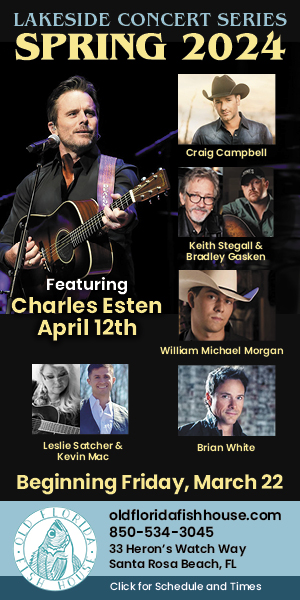The Extraordinary Story Behind The Community
By Kelly Humphrey
Some might call it the end of an era. After more than 45 years of serving as the face of the Bluewater Bay development, Raimund Herden has left the area to return to his native Germany. As he says good-bye to his adopted community, he feels a sense of satisfaction – and a bit of surprise – at all that he and his partners have been able to accomplish.
“If you had told me back in 1976 that I would still be here 45 years later, I wouldn’t have believed it,” he said with a smile. “When we started out to build, we underestimated how long it would take. That’s probably a good thing, because if I had known then it would take this long, I might not have done it. But it’s an incredible story, really. We created credibility when no one thought that we could succeed.”
“Quality, quality, quality”
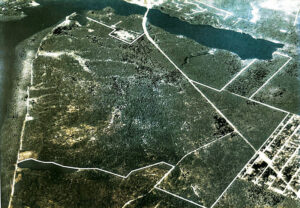 From the first time Herden set eyes on the nearly 2,000 acres of woodlands on the northern shore of the Choctawhatchee Bay, he knew that the area had the potential to become a first-class community. Convincing others, however, was a challenge. Other Northwest Florida developers had attempted to build large scale planned communities in the past, but most had ended up in bankruptcy court. Herden was determined to learn from their mistakes.
From the first time Herden set eyes on the nearly 2,000 acres of woodlands on the northern shore of the Choctawhatchee Bay, he knew that the area had the potential to become a first-class community. Convincing others, however, was a challenge. Other Northwest Florida developers had attempted to build large scale planned communities in the past, but most had ended up in bankruptcy court. Herden was determined to learn from their mistakes.
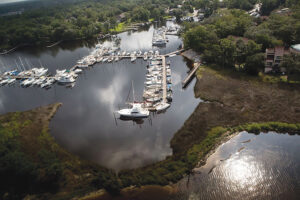 “When a project is different and innovative, there will always be naysayers who say, ‘that’s too big of a dream,’” said Nathan Sparks, the executive director of the Economic Development Council of Okaloosa County. “But Raimund and his partners didn’t let that stop them. At the time it was kicked off, Bluewater Bay was one of the only truly planned communities in this area. Other developers have begun to replicate the idea of ‘place making,’ but it was Raimund and his team who proved that it could be done.”
“When a project is different and innovative, there will always be naysayers who say, ‘that’s too big of a dream,’” said Nathan Sparks, the executive director of the Economic Development Council of Okaloosa County. “But Raimund and his partners didn’t let that stop them. At the time it was kicked off, Bluewater Bay was one of the only truly planned communities in this area. Other developers have begun to replicate the idea of ‘place making,’ but it was Raimund and his team who proved that it could be done.”
Why did Bluewater Bay succeed where other communities failed? Herden attributes it to one word: quality.
“That was always our guiding principle,” he said. “Quality, quality, quality. Everything we did had to be of the best quality. When we sat down to talk about the plans, one of the first things that came up was how we would install the utilities. I wanted them to be underground because that’s how we did it in Europe. That wasn’t common here, but I think it makes all the difference.
 “When we laid out the design for the streets, we purposely chose winding roads and cul de sacs to make it safe for children to play,” he added. “And as we were drawing up lots, we fought for every tree. We put on boots and walked through the property to make sure that the lot lines were drawn so they saved the big live oaks and magnolias. We had to sacrifice some lots in the process, but it was important to us.”
“When we laid out the design for the streets, we purposely chose winding roads and cul de sacs to make it safe for children to play,” he added. “And as we were drawing up lots, we fought for every tree. We put on boots and walked through the property to make sure that the lot lines were drawn so they saved the big live oaks and magnolias. We had to sacrifice some lots in the process, but it was important to us.”
A focus on families
There were others factors at play as well. Before the first shovelful of dirt was turned at Bluewater Bay, Herden set out on a pilgrimage to visit other resort communities to discover what worked, and what didn’t.
“One of the things I quickly discovered was that many of the developers had made too many promises that they couldn’t keep,” he said. “I remember seeing a sign on U.S. Highway 98 many years ago that promised a new golf course that was going to be ‘equal to Augusta National.’ Of course, there was no way they were going to build something that was equal to Augusta National. That’s ridiculous.”
Not surprisingly, the highly touted golf course was never built, and plans for other developments never materialized either.
“I soon found out that most of the bigger projects that had failed were over-leveraged,” he added. “That wasn’t our problem. We always delivered on our promises to our investors, and so we built credibility.”
While traveling to well-known resorts across the south, Herden observed that many of the communities looked like “ghost cities” during the off-season. That was a problem he vowed to avoid.
“We knew that if we really wanted to succeed, we had to focus on permanent, year-round residents and be family-friendly,” he said. “Only one out of every six lots could be sold to an investor.”
Inexperience was an asset
At the outset of the project, Herden planned to serve as simply an investor. But the reality of the transaction turned out to be quite different from his earlier expectations.
“I was originally told that the land was owned by Barnett Bank in Pensacola, but it was not,” he recalled. “We bought it from The Cadence Corporation, a 100 percent subsidiary of our U.S. business partner. This company was also supposed to be the general partner and developer. But they were no longer interested in that aspect, and very soon they disappeared. In order to save our investment, I had to switch my role from investor to developer, without any experience in land development.”
In those early days, Herden was presented with a conceptual plan prepared by an engineer named Dave Weaver, who would later sign on as the first employee of the Bluewater Bay Development Company. During one of the first planning meetings for the development, Weaver told Herden, “The projections that were the basis of your decision to go forward are completely unrealistic, both regarding the projected development time and the numbers.”
While the project ended up taking much longer and cost much more than expected, Herden was determined to succeed.
“In a way, my inexperience was an asset,” he explained. “If I had been an experienced developer, I probably would have walked away from the project. But I wanted to save our investment.”
The secret to success
Herden shared some other secrets to his success.
“When we started the development process, we had assembled a team of exceptionally talented, dedicated, and hard-working people,” he said. “The main reason for our success is the fact that many large developments were financed exclusively with German capital, either by individuals or through partnerships. The first major project was the Marina Cove Village, with more than 130 homes. Later German investments included all 100 units of the Royal Oak patio homes on Bay Drive, the entire Glen Eagles neighborhood between fairway 1 and 2 of the Bay Course, Sunset Beach (Bluewater Bay’s most exclusive subdivision), Saint Andrews Village, the Glenlake development, and Magnolia Plantation, the final and largest community.”
Other German-financed projects include the Visitors and Information Center (now Bluewater Orthopedics), all of the Merchant’s Walk shopping and business center, the gas station and dry cleaners on Range Road, the Winn Dixie shopping center, and most of the other commercial buildings on State Road 20, including the $20+ million senior independent living community.
“The first 18-hole golf course (Bay/Lake), the clubhouse and driving range were also financed by a German partnership,” Herden added. “I was personally involved in many of these enterprises, either as an investor and/or general partner. All of these projects turned out well for our overseas investors.”
“What’s next?”
Almost everyone who discusses Herden and the impact of the Bluewater Bay development comes back to some form of the word ‘vision.’
“If you look at the growth of our area over time, there’s always an individual or a team who serves as the visionary,” Sparks said. “Raimund has become the face of Bluewater Bay, and rightfully so, because he has such a passion for the community. He’s always looking around and asking, ‘What’s next?’”
For many years, that question was answered with more developments designed to meet the needs of a wide spectrum of residents. Since the first homes were completed in 1978, more than 30 separate subdivisions have sprung up in Bluewater Bay, ranging from condominiums and patio homes to multi-million-dollar waterfront villas. For Herden, the final stage of development came in 2015 with the opening of the $20+ million Superior Residences (now known as American House), an upscale retirement facility with one- and two-bedroom apartments and multiple amenities.
“I think that has been my best, most successful project,” he said, pointing to an early brochure promoting the community. “As always, we believed in quality. We wanted to make it the very best it could be.”
Bumps along the way
Despite his pride in the success of Bluewater Bay, Herden is the first to concede that he has some regrets. There have been bumps along the way as the community has grown, and he hasn’t always been happy with the way things have turned out.
A case in point is the saga of Magnolia Plantation, a gated subdivision within Bluewater Bay that was originally built as a golf course community. Herden was the sole developer of the project, and he envisioned that it would be the last neighborhood of single-family homes in the greater Bluewater Bay development. Construction began on the first homes in the neighborhood in 1993.
Three years later, Europco Management Company of America (EMCA), the general partner of the Bluewater Bay development, sold off its “leisure services assets” to a company that would become known as the Bluewater Bay Resort. These assets included the community’s tennis courts, swimming pools, 36 holes of golf, a soccer and baseball field, and the marina.
In April 2013, the resort closed the Magnolia course to sell some of its acreage to developers. Over the next several months, the abandoned course fell into disrepair and became an eyesore. Homeowners appealed to the Board of Okaloosa County Commissioners to force the resort to maintain the property.
As the original developer of the property, Herden was drawn into the controversy, and felt compelled to take the side of the residents in the matter.
“Jerry Zivan, one of my original partners, took the opposite side,” Herden said. “It was very disappointing to me. I don’t know how you could not want to support the residents.”
Herden filed a lawsuit to keep the resort from developing the property.
“It cost me money, but I did it only for the people,” he said.
Niceville rejects annexation
Ironically, Herden isn’t the only one who might have some regrets. In late 1978, after already investing in or committing to millions of dollars for infrastructure and some of the first development projects, Herden and his team approached the Niceville City Council with a proposal to annex the Bluewater Bay property into the city limits.
“We had, I thought, a very impressive presentation,” he recalled. “But the city council members, fearful of the consequences should the development fail like so many others in our area had, rejected our offer. In retrospect, it was a very bad and consequential decision, because the city lost a very significant and upscale tax base. But I cannot blame them. They were elected to be stewards of the taxpayers’ money, and they didn’t want to take a chance on another unproven community.”
A sense of pride
Although he isn’t thrilled with all of the new construction going on in Bluewater Bay, Herden’s overall pride in the community he helped establish is evident. He loves to share some of the many articles and books that have praised the development, including a 1995 book on “Best Development Practices” prepared for the Florida Department of Community Affairs.
“I like to think of it like the title of the Shakespeare play – ‘All’s Well that Ends Well,’” he said.
Herden isn’t alone in his belief that Bluewater Bay has had a tremendous impact on the growth of Northwest Florida’s economy and infrastructure.
“The Bluewater Bay development has evolved over the past five decades, converting a wooded area in central east Okaloosa County into a vibrant residential-commercial community,” Okaloosa County Tax Collector Ben Anderson stated. “Its assessment base value has grown from just thousands of dollars into a community assessment value of over 1 billion dollars. Its fiscal impact for Okaloosa County is significant.”
Anderson added that from a personal perspective, “As a resident of Okaloosa County since 1960, the Bluewater Bay developers lead by Raimund Herden shared a vision with all of Okaloosa County on how to blend a residential community. The everyday quality of life for the residents of Bluewater Bay reflects the highest standards for all of Okaloosa County”
Justin Gordon, director of tax services for Okaloosa County, points to the huge support Bluewater Bay’s residential and commercial property tax revenues provide to entities that support the greater area.
“Those dollars help fund everything from the North Bay Fire District to schools and parks,” he said. “Over the years, those numbers have consistently gone up as the properties have increased in value.”
More than just tax revenues are at play, however. As Nathan Sparks explains, the Bluewater Bay development has laid the groundwork for countless similar projects across Northwest Florida.
“Bluewater Bay has been a cornerstone, catalytic project for Okaloosa County for many years,” he said. “Were it not for that initial project setting the stage, we wouldn’t have seen the other marquee development that followed. The city of Niceville and Okaloosa County as a whole have benefitted from infrastructure like the Mid-Bay Bridge and its connecting bypass, all of which can draw a direct line to the catalyst that is Bluewater Bay.”


